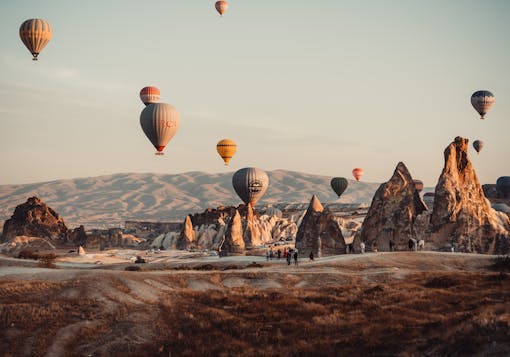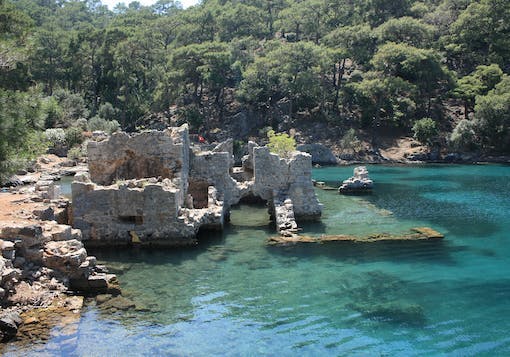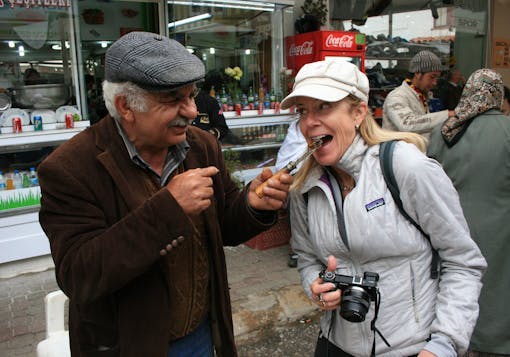Sustainable Travel Guide: Türkiye
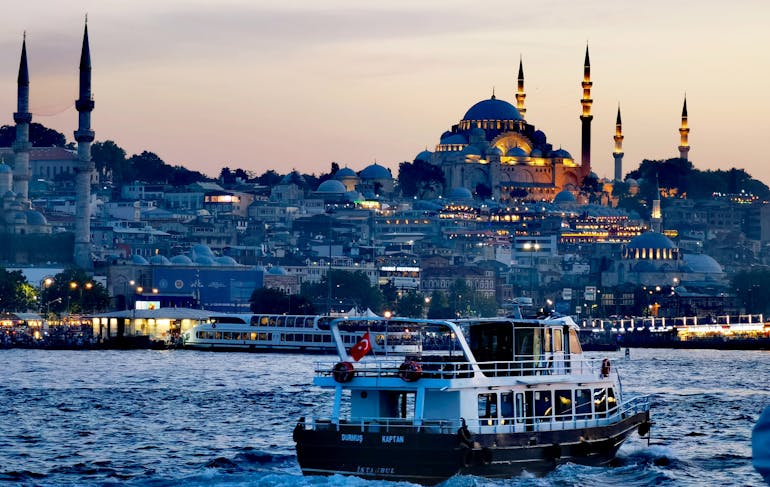
18
Oct
Sustainable Travel Guide: Türkiye
This guide will cover everything you need to know about sustainable travel in Türkiye. You will find an overview of Türkiye’s environment, economic standing, and sociocultural background through a sustainable lens. You will also find key do’s and don’ts for sustainable travelers that will help prepare you for your visit. Our guide also highlights sustainable travel activities and tips that tourists can incorporate into their trip to Türkiye.
But first…
Why do we write “Türkiye” instead of “Turkey”?
The spelling of “Türkiye” instead of “Turkey” is important for several reasons, including accuracy and respect. “Türkiye” is the Turkish name for the country, and it is written in the Turkish alphabet. Using the correct spelling shows respect for the local language, the country, and its people, and shows cultural sensitivity.
Sustainable Travel in Türkiye: Key Sustainability Pillars
Environmental
Türkiye’s diverse landscape is primarily made up of several mountain ranges. Türkiye’s mountainous landscape has evolved thanks to the tectonic plates that exist beneath its surface. The country remarkably exists on three tectonic plates: the Eurasian plate, Arabian plate, and Antalonian plate, literally existing as a land bridge between the continents of Europe and Asia.
Thanks to Türkiye’s geology and volcanic history, we can find here some of the most unique landscapes on earth! One of the most iconic for tourists is Cappadocia, which boasts eye-catching canyons, intriguing caves, and spectacular rock formations known as fairy chimneys.
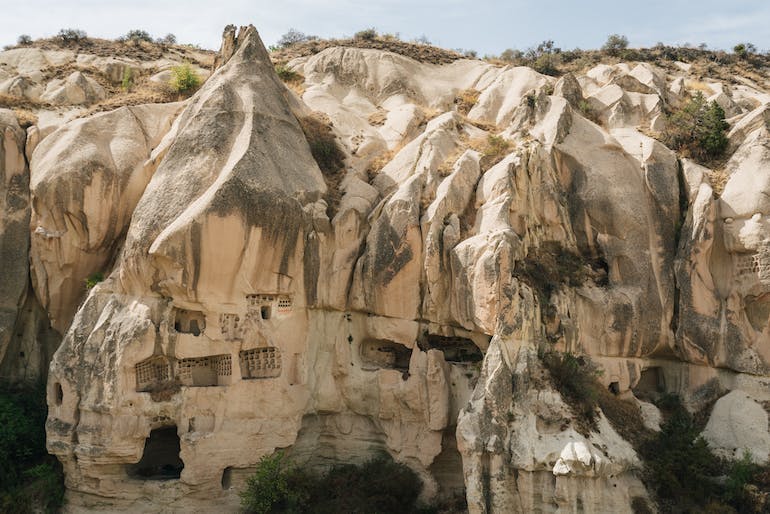
However, Türkiye’s positioning over these tectonic plates also poses a natural disaster risk: it is one of the most earthquake-prone areas in the world. In February 2023, Türkiye witnessed the worst earthquake event in its history.
When natural disasters occur in Türkiye (or in any country), it has several impacts on tourism.
- Short-term: Ongoing or upcoming trips are disrupted or canceled, respectively.
- Medium-term: It takes time to recover and rebuild affected areas and communities.
- Long-term: Travelers need to re-acclimate to the thought of travel in or near the affected area, and feel safe and confident that they’ll have a positive experience.
According to Condé Nast Traveler following the February 2023 quake, it was important to remind tourists, that “the disaster zone makes up only a fraction of Türkiye's overall land mass, meaning most of the country is safe to travel in.” (Read more about the economic impacts of the earthquakes in Türkiye in the next section.)
Earthquakes aside, Türkiye is home to the mythical mountain, which also happens to be a former volcano, Mount Ararat (known as Mount Ağrı). The country’s highest peak can be found in the east, close to the Armenian border, and is an attractive spot for many climbers. The mountain ranges in Türkiye are mostly underdeveloped, something that excites many adventure travelers and makes Türkiye a great sustainable travel destination.
Türkiye is also considered to be a notable destination for visitors because it is surrounded by water on three sides. It has shores along the Black Sea, the Aegean Sea, and the Mediterranean Sea. As a result, Türkiye is gifted with many beautiful beaches and turquoise waters, making it the perfect spot for beachgoers and water lovers who enjoy sea-kayaking, snorkeling, sailing, or swimming!
Economic
As mentioned above, Türkiye’s economic landscape has been seriously impacted by the country’s history of natural disasters. In 2023 alone, Türkiye lost $34.2 billion from the earthquake in February, which doesn’t include the cost of reconstruction.
There have been many actions put in place to support the local economy including the establishment of the Disaster Reconstruction Fund, and humanitarian aid from the EU. However, since the Turkish tourism sector alone provides nearly 2.6 million jobs, tourism is an extremely important industry, and “revenue from this industry is especially critical at this time.”
Tourists are reminded that, if possible to safely visit a different part of the country after a natural disaster, their visit makes all the difference to local businesses. In the case of the February quake, the main tourist destinations were “far from the quake-hit areas and are mostly unaffected.”
Spending money on local businesses, such as hotels and restaurants, is one of the simplest ways to support local economies as well as the country’s economy as a whole. For more information about how to be a respectful tourist in Türkiye in the post-Earthquake period, you can read more here.
Sociocultural
Türkiye, previously part of the Ottoman Empire, is one of the few countries that span multiple continents. It is an incredibly rare destination featuring both Eastern and Western influences.
Throughout history, Türkiye has been conquered by many different groups in Europe, Africa, and Asia including the notable Greek, Persian, and Roman empires. You can see the remnants of various cultural influences across the country. The resulting cultural fabric is a fascinating blend of traditions and practices.
The majority of the population in Türkiye are Muslim. You can see the deep connection Türkiye has with Islam today in the architecture, the daily call to prayer, and other social practices. Even though many residents don’t practice religion strictly, it is still very closely connected to Turkish society, especially in rural areas. (Find helpful do’s and don’ts for visiting a Muslim country below.)
Today, around 75% of the population is ethnically Turkish and roughly 90% of the population speak Turkish as their first language. English is one of the most popular foreign languages spoken. However, it shouldn’t be assumed that all people in Türkiye understand English. Knowing some important phrases in Turkish such as ‘please’ (lütfen), 'thank you’ (teşekkürler), and ‘can you help me?’ (bana yardımcı olabilir misiniz?) is highly recommended for travelers.
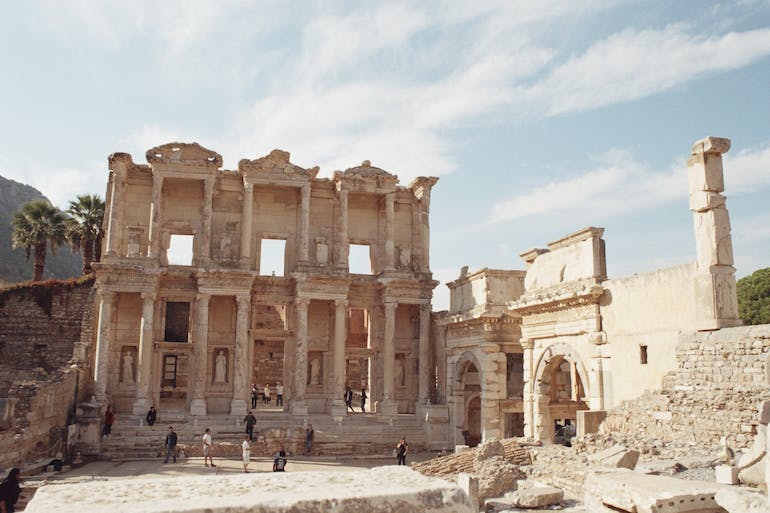
The ancient ruins of Ephesus.
Everything Else
Healthcare
Ensure your routine vaccinations are complete before visiting Türkiye. It is advised that you should look into your vaccination needs roughly 8 weeks before your trip.
Anti-malaria medication also might be worthwhile if you are planning to visit between May to October (a popular time for many trips here). This is when travelers are at the highest risk of catching malaria.
Additionally, in 2023 there were increased cases of gastrointestinal illness, such as salmonella, in travelers returning from Türkiye. Travelers are advised to wash their hands thoroughly, eat fruits that are peeled, and only eat thoroughly cooked foods to reduce their risk of contracting these illnesses. (Find other do’s and don’ts below.)
Safety
Türkiye is listed on several travel advisories as a ‘level 2’ country, meaning travelers should exercise increased caution.
Terrorism risks are higher closer to the border with Syria and it is advised not to travel to these areas. Unfortunately, there is also the risk of terrorism in larger Turkish cities, especially in popular areas. Crimes such as pickpocketing, bag snatching, and mugging, are also common in busy places. Food or drink spiking is another method used to steal belongings, so never leave your food or drinks unattended or accept anything from strangers. Note that homosexuality, although legal in Türkiye, is still met with a lot of resistance. It is advised that travelers use discretion; read more advice here.
Four safety tips for traveling to Türkiye
- Always pay close attention to your personal belongings, food, and drink.
- Monitor the media for emerging threats and report any suspicious activity.
- Avoid traveling during the Persian New Year (March 20-21st), and on Labour and Solidarity Day (May 1st) since these are popular periods for rallies to take place. These holidays take place on the same dates each year.
- Know how to respond in the case of an earthquake. You can read detailed instructions on what to do on the Smart Traveller website under the Climate and Natural Disasters section.
Seasonal
Türkiye’s mountainous landscape results in very different climate conditions throughout the country that vary by region. Generally, there are four different seasons:
- The winter months are cool and wet. This is the perfect time to visit to experience the ski season in Türkiye. The mountains typically experience longer winters, and snow might remain until April. However, the Aegean region of Türkiye is known for having great weather all year round, even during the winter season.
- The spring season is a great time to visit the eastern regions of Türkiye if you are interested in sustainable travel featuring nature, fewer crowds, and more comfortable temperatures.
- The summer season is by far the busiest season! Türkiye is gifted with warm, dry summers and tourists always flock to the coastal regions along the Mediterranean and Black Sea.
- The fall season, like spring, is another great alternative to the busy summer months. Temperatures are quite comfortable and tourist traffic dwindles. The rains might start to return but, generally, shoulder season in Türkiye is an excellent time to visit.
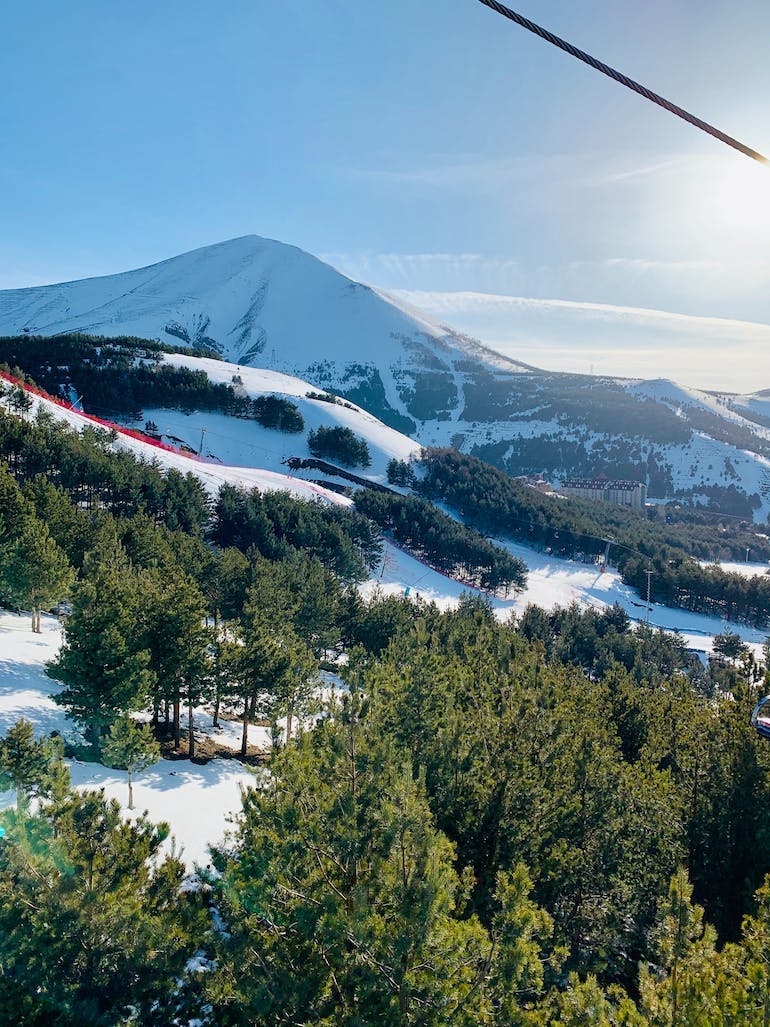
Holidays
Being a Muslim country, many holidays in Türkiye align with the Islamic religion. There are two holidays in particular that stand out as exceptional times to visit, one of which is centric to Islam.
An incredibly important holiday in Islam is called Ramazan (this is the Turkish name for Ramadan). Ramazan is celebrated over the course of a month where participating people fast from sunrise to sunset. After sunset, families will enjoy a light meal called Iftar. At the end of the month, during Ramazan Bayrami (also known as Eid-ul-Fitr), families will come together to enjoy a large meal. Traveling during the month of Ramazan is compared to visiting during a carnival period, with performances and decorations found across cities. Read our Ramazan travel tips in the dos and don’ts section below!
Another really special holiday is National Sovereignty and Children’s Day. Celebrated annually on April 23rd, this holiday commemorates Türkiye’s first Grand National Assembly and is dedicated to children, the future of the nation. Over the course of a week, the country comes alive with many children’s festivals and performances. The country hosts children from around the world to exchange stories and learn about different cultures. This would be a really interesting and fun time for families to visit Türkiye!
For a full list of holidays that take place in Türkiye, click here.
Sustainable Travel in Türkiye: Do’s and Don’ts
What to do in Türkiye:
- Use insect repellent to protect yourself from insect-borne diseases such as malaria.
- Only drink boiled or bottled water to protect yourself from waterborne diseases. Consider bringing a water bottle with a built-in filter.
- Do not use plastic water bottles as Türkiey is still developing its recycling practices.
- Be aware of your surroundings, potential terrorism threats, and civil unrest. Monitor the media for updates on emerging threats.
- Avoid large crowds, demonstrations, and rallies
- Always keep an eye on your belongings.
- Always carry a photo ID with you. It is illegal not to carry a photo ID with you at all times, and the authorities may stop you for random ID checks.
- When visiting Mosques, women should cover their heads and shoulders.
- When visiting Mosques, everyone should wear loose-fitting clothing and remove their shoes before entering.
- When visiting Mosques, remember to be a respectful, quiet visitor.
- Learn basic Turkish phrases before visiting.
- During Ramazan, expect it to be less busy and anticipate that some businesses may close early.
- Show respect to the Muslim community by always drinking alcohol in moderation.
- Use public transportation. Trains and buses have been improved in recent years to increase the comfort of travelers.
- Express sympathy to earthquake survivors if you come across one by saying “geçmiş olsun” (pronounced getch-mish ol-soon).
- Be sure to verify if you need an e-visa to enter Türkiye before your visit (US citizens do).
What NOT to do in Türkiye:
- Avoid using ATMs in the street. Instead, use ATMs in banks, shops, or shopping centers instead.
- All couples should avoid public displays of affection.
- Do not approach stray dogs as they can be aggressive. (The stray cats, however, are seen as “friendly neighborhood cats” - though you still may want to avoid approaching them.)
- Do not export antiquities from Türkiye. Even if legally sold to you within the country, exporting them is illegal. Check the legal requirements before purchasing antiques.
- Do not buy souvenirs with seashells or coral.
- Do not visit Mosques on Fridays as this is the Muslim day of worship.
- Do not be surprised if vendors try to negotiate prices when you are shopping. Don’t haggle unless you are genuinely interested in buying something.
- During Ramazan, avoid eating and drinking in public to show respect to those who are fasting.
- During Ramazon, do not be surprised if you are woken up before sunrise... locals will walk through the street banging drums!
- Avoid all-inclusive resorts. Locally run accommodations and businesses are great options for sustainable travel in Türkiye.
- If indicated, do not put toilet paper in the toilet. (If there is a bin beside the toilet, it is meant for toilet paper.)
- Never leave your food or drink unattended.
6 Sustainable Travel Activities in Türkiye
- Explore the Turkish Riveria
- Discover Türkiye’s Rich History
- Indulge in Authentic Turkish Food
- Take a Hot Air Balloon Ride in Cappadocia
- Trek Mount Ararat
- Try a Traditional Hammam or Turkish Bath
1. Explore the Turkish Riviera
The Turkish Riviera has been nicknamed the Turquoise Coast because of its stunning blue waters. This has become a really popular place for tourists to experience the iconic Turkish seaside and enjoy a relaxing beach holiday.
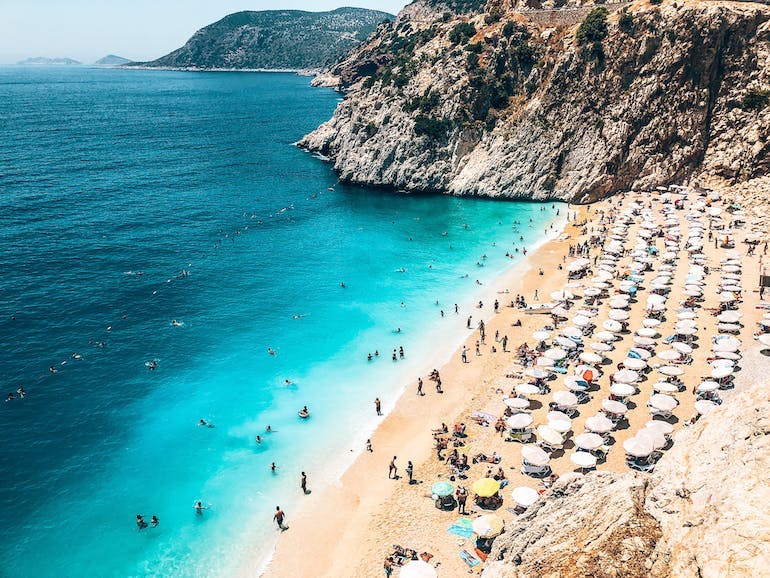
To vacation here sustainably, avoid all-inclusive resorts and instead support local communities by spreading out where your tourism dollars go. All-inclusive resorts, though tempting, come with a lot of coastal pollution and over-tourism, creating stressors on the environment. In fact, in 2022 the Turquoise Coast Environment Fund was established to protect and restore the suffering marine ecosystem.
Other ways to experience the Turkish Riviera are to hike along it or sail beside it. The Lycian Way trail – the longest trail in the country – navigates this unique coastline. It is actually known as one of the most beautiful long-distance treks in the world! Visitors can explore coastal villages, enjoy water-based activities such as kayaking and snorkeling, and discover historic ruins.
2. Discover Türkiye’s Rich History
Part of what makes Türkiye’s history so unique is its connections with different cultures and empires. As a result, across Türkiye, travelers can encounter historic Roman ruins, iconic Ottoman Mosques, and even Byzantine churches. For instance, the city of Ephesus, from the 10th century BC, houses the Temple of Artemis, one of the Seven Wonders of the World. Another notable historic gem includes the ancient city of Olympos, which is beautifully situated along the Turkish Riviera.
Istanbul is a famous historical city that attracts tourists from around the world. Known as being the only city in both Europe and Asia, here you can really experience Türkiye’s blend of cultures. A must-visit in Istanbul is the renowned Hagia Sophia, a Byzantine church constructed in 537 AD. As a tourist, you should remember to make use of the city’s extensive public transit system. Some buses and trams can connect you to anywhere you want to visit. This is a great way to keep your carbon footprint low on your journey.
Our Istanbul & Cappadocia trip will introduce you to the gems of Istanbul, and you can customize your itinerary to add on Ephesus or Troy if the timing allows. Both the Lycian Way and the Turquoise Coast itineraries include visits to Olympos, where you can search for the mythical fire-breathing monster, the chimera!
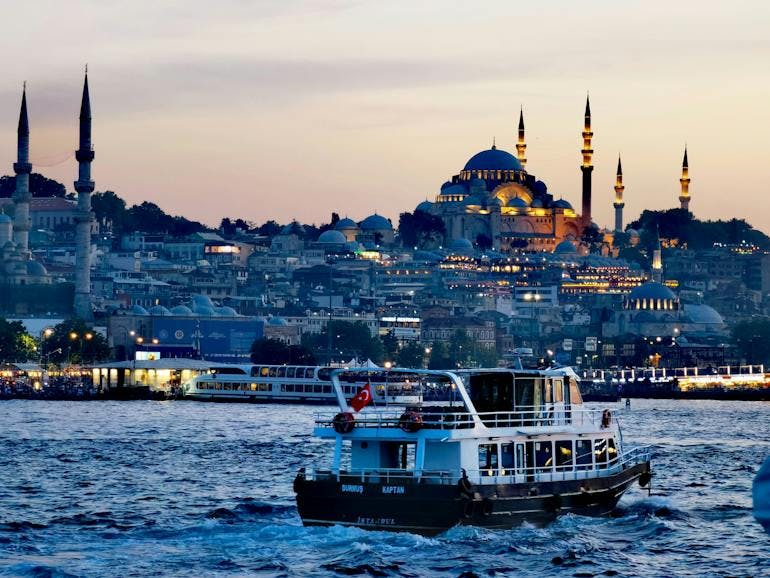
Istanbul at sunset.
3. Indulge in Authentic Turkish Food
No trip to Türkiye is complete without trying authentic Turkish food. Whether it be Turkish breakfast, Turkish coffee, kebabs, or baklava, Turkish cuisine is known and beloved worldwide. One of the best ways to experience this is to escape the tourist centers and venture into more off-the-beaten-path areas. This is where you will find the truly localized delicacies.
Yugen Earthside offers a Food and Wine Tour along the western coast of Türkiye, where guests can partake in cooking classes, olive oil tastings, wine tastings, market visits, and food tours. You can learn more about our trip here!
4. Take a Hot Air Balloon Ride in Cappadocia
You may have seen the colorful hot air balloons sweeping across Cappadocia’s captivating landscape.
But we asked ourselves:
Are hot air balloon rides actually a sustainable activity?
On the one hand, hot air balloon rides have a relatively low carbon footprint. They use propane, a gas that comes from both natural gas processing and crude oil refinery processes, which is considered to be an eco-friendly fuel. On the other hand, hot air balloons cannot be recycled and are mainly made of nylon.
So, how can you approach this typical touristic activity in Türkiye? Do the proper research before you book your tour!
For example, you could research individual providers of hot air balloon tours to ensure they are respecting local regulations. Or, to make things simpler, you can book through responsible companies that are doing some of this leg work for you.
Yugen Earthside’s local partner in Türkiye worked with a climate consultancy to calculate the carbon emissions of each of its trips, incorporate the cost of carbon offsetting into its trip prices, and issue those carbon offsets annually. In addition, Yugen Earthside includes carbon removal contributions for each traveler who books through us. (Read about the difference between carbon offsets and carbon removals here.)
Also important to mention is what else you do in or around Cappadocia. On YE’s Cappadocia tour, you do the hot air balloon ride to see the special landscape from above, and you also learn about the geology at ground level, as well as explore the underground caves of Cappadocia. This provides a more comprehensive visit to the region to help you fully appreciate its magic. This, combined with the carbon offsets and carbon removals, might be the most sustainable way to have this bucket list experience.
In short, while there can be some debate about the sustainability of hot air balloon rides: if you have your heart set on doing it, make sure it is done as responsibly as possible! And if you don’t have your heart set on it, contact us about customizing the itinerary.
5. Trek Mount Ararat
Mount Ararat is a dormant volcano that lies in the eastern regions of Türkiye towards the Armenian border. Even though this mountain is considered to be one of the easier climbs in the 5,000 meters above sea level range, do not underestimate this challenge. Permits are required for the trek and guides are strongly recommended. A typical trek can take three to five days.
There are also many ski adventure tour options available for visitors traveling in the colder months. However you explore Mount Ararat, always remember to leave no trace and to book with an ethical tour operator if you choose a guided experience.
6. Try a Traditional Hammam or Turkish Bath
Visiting and experiencing a Turkish Bath, known as a Hammam in Turkish, is a relaxing, authentic experience everyone should try while visiting Türkiye! Hammams have been utilized since before the Ottoman Empire. The vast majority are separated by gender, and then experienced in the nude (yep!).
Hammams are circular steam rooms designed for visitors to relax and detox. There is usually a main room with sinks and sitting areas along the walls for your personal use, and then private rooms used for treatments such as a traditional body scrub, massage, or waxing.
in the center of the room. If you opt for the scrub, you’ll likely warm up and wait in the steam room with the sinks, where you can sit back and pour warm water on yourself. Then, you’ll be taken to a private room and lay on an “elevated circular platform called the 'göbek taşı'", which translates to ‘naval stone.’
There are some environmental concerns behind traditional hammams as they consume a lot of natural resources such as water and wood. In other Islamic countries, such as Morocco, “these public baths each use an average of one ton of wood per day, and firewood contributes to 76% of deforestation.”
While the environmental impact of hammams in Türkiye is not entirely clear, there is one thing for certain: the importance of centuries-old cultural experiences. Aquaculture is so deeply rooted in Turkish history, that these historic bathhouses must be preserved as they “build a bridge between the past and future generations”.
When visiting a hammam, tourists can purchase traditional bath towels known as “peştamal” which are made of natural fibers. You should also bring your own soaps and shampoos. Using natural bar soap and shampoo bars are great plastic-free alternatives.
Türkiye as a Sustainable Destination
As a G20 country, Türkiye is very active in the discussions surrounding the United Nations’ Sustainable Development Goals (SDG). They signed the Paris Agreement in 2016 and have a net-zero carbon target by 2053. They have a number of SDGs they are working towards and they have already made significant progress towards 6 of them, especially in providing better quality public services.
Environmentally, however, Türkiye has work to do in moving away from coal and other fossil fuels, which represent 88% (1) of their energy consumption. This means choosing eco-friendly accommodations and using public transit in Türkiye is incredibly important and impactful. One of the easiest ways tourists can support Türkiye’s environmental development is by reducing their waste. Only about 10% (1) of Türkiye’s waste is recycled or composted! Tourists can bring reusable products, such as water bottles and bags, to avoid contributing to landfills in Türkiye.
All in all, Türkiye has many beautiful landscapes for tourists to enjoy responsibly. From its ancient cities to its high mountains and craggy rock formations, down to its sparkling turquoise coast, there are many ethical and sustainable ways to explore this country. Sustainable travel in Türkiye is entirely possible, especially when tourists research their trip thoroughly on their own, or book through companies upholding the values of responsible tourism.
(1) OECD (2019), OECD Environmental Performance Reviews: Turkey 2019, OECD Environmental Performance Reviews, OECD Publishing, Paris
This post may contain affiliate links. This means we may earn a small commission if you purchase a product from our link, at no additional cost to you.
